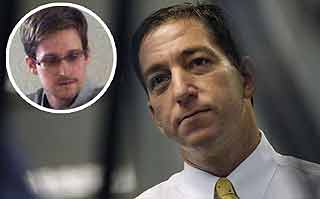In his new book, “No Place to Hide,” journalist Glenn Greenwald provides new details on Edward Snowden’s personal story and his motivation to expose the U.S. surveillance state. “The stuff I saw really began to disturb me. I could watch drones in real time as they surveilled the people they might kill,” Snowden told Greenwald about his time as a National Security Agency contractor. “You could watch entire villages and see what everyone was doing. I watched NSA tracking people’s Internet activities as they typed. I became aware of just how invasive U.S. surveillance capabilities had become. I realized the true breadth of this system. And almost nobody knew it was happening.”
Greenwald joins us in studio to describe the inside story of the man behind the NSA leaks. “The fact that this individual with no power was knowingly risking everything in his life for a political cause, and really ended up changing the world, I think is a remarkable lesson for everybody,” Greenwald says. “It’s certainly something that’s inspired me and has shaped how I think about things — and probably will for the rest of my life.”
Transcript
This is a rush transcript. Copy may not be in its final form.
AMY GOODMAN: This is Democracy Now!, democracynow.org, The War and Peace Report. I’m Amy Goodman, as we continue our conversation with the investigative journalist Glenn Greenwald, whose new book, just out today, is titled No Place to Hide: Edward Snowden, the NSA, and the U.S. Surveillance State. This is a clip of Edward Snowden during his recent TED Talk, when he was asked by Chris Anderson about the risks he took in exposing the NSA’s surveillance programs.
CHRIS ANDERSON: Most people would find the situation you’re in right now in Russia pretty terrifying. You obviously—you know, you heard what happened—what the treatment that Bradley Manning got, Chelsea Manning as now is. And there was a story in BuzzFeed saying that there are people in the intelligence community who want you dead. How—how are you coping with this? Are you—how are you coping with the fear?
EDWARD SNOWDEN: You know, it’s—it’s no mystery that there are governments out there that want to see me dead. I’ve made clear again and again and again that I go to sleep every morning thinking about what can I do for the American people. I don’t want to harm my government. I want to help my government. But the fact that they are willing to completely ignore due process, they’re willing to declare guilt without ever seeing a trial, these are things that we need to work against as a society and say, “Hey, this is not appropriate.”
AMY GOODMAN: Now, let’s be clear: That’s Edward Snowden giving a TED Talk, not in person, because he has political asylum in Russia right now, very concerned that if he came to the United States—well, as you say in your book, Edward Snowden was inconceivably calm in Hong Kong and felt profoundly at peace with what he had done. You write, “He once joked, ‘I call the bottom bunk at Gitmo.'” Talk about who Edward Snowden was and is. What is his background? You reveal things in this book that most people haven’t talked about before.
GLENN GREENWALD: Yeah, I mean, to me, this is, you know, from my own personal experience, probably the most stunning part of the story, is—and it’s what I spent a long time in Hong Kong trying to figure out and investigate, through asking him questions and then thinking about, as well—and I still think about it—which is: What would lead a seemingly ordinary 29-year-old, with his entire life ahead of him, someone very well adjusted, by all appearances, with a good job and a very good income and a great career and a girlfriend who he loves and a family who’s supportive, to give up his entire life to literally risk decades, if not the rest of his life, in prison, not to enrich himself or to extract vengeance on somebody, but in pursuit of a political ideal, to confront an injustice that he believes is taking place? What actually takes place in someone’s mind and in their spirit and in their soul that leads them to engage in such an obviously self-sacrificing act? I mean, that’s a really hard, but important question to think about. And what really struck me most about him was that he grew up as a son of, essentially, family—a family that worked for the federal government. His father was in the Coast Guard for 30 years. I think you could describe him as lower middle class. He grew up in a very kind of ordinary home. He actually didn’t even finish high school, because he never was fulfilled by high school, despite how obviously intelligent he is. But he’s somebody who is just very ordinary. I mean, he didn’t have family wealth or family connections or any prestige or position or power.
Full Transcript at Democracy Now!










